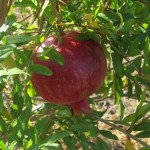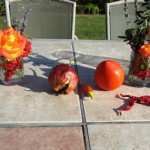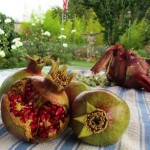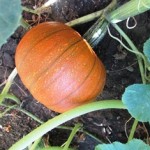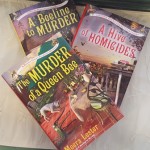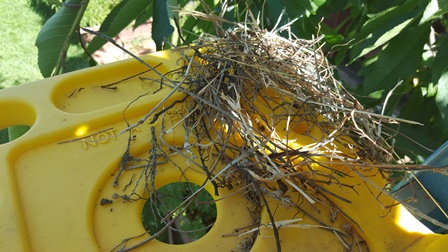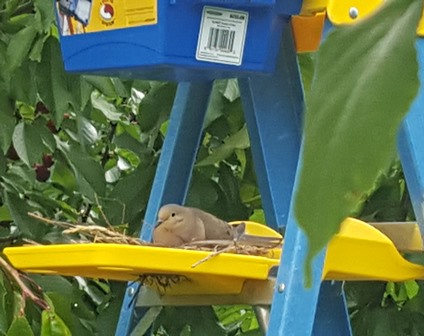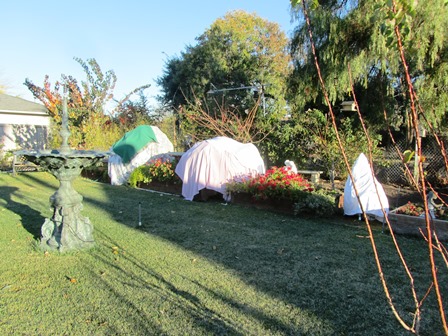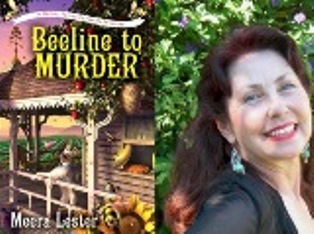Simple Gratitude for the Harvest
It’s nearly Thanksgiving and our Henny Penny Farmette continues to bring forth delicious, organically grown edibles for our table for which we feel truly grateful.
We give thanks, too, for neighbors like Dan and Annie. This past Sunday, Annie carted to our house a box of persimmons and bags of apples and pomegranates. We harvested all our apples last month so her timing was great. While we have persimmons and pomegranates hanging on the trees in our small orchard, many are not yet ripe enough to pick.
Last month, I froze cubes of butternut squash in freezer bags and readied pumpkin flesh for pie. While picking a few ripe persimmons recently, I noticed that we’re sharing them with a visitor who seems to sneak in and munch during the night. I’m thinking the culprit could be a raccoon, opossum, skunk, squirrel, fox, or a gaggle of wild turkeys that seem to make an annual pilgrimage through our area.
The two main types of persimmons grown on our farmette are Fuyu and Hachiya. The Fuyu is rather squat-looking and Hachiya has an elongated shape. Both take on a bright orange color in the fall. When fully ripe, Fuyu is sweet and crunchy like an apple whereas the Hachiya is soft like jelly. Though commonly thought of as fruits, persimmon and pomegranate are technically berries.
Fuyu persimmons can be peeled, sliced, and eaten fresh, roasted, or tossed into salads. They add a vibrant splash of orange to a winter salad that could include slices of citrus and pear tossed with greens,walnuts, pomegranate seeds, and goat cheese.
Pomegranates are ripe when their leathery outer covering turns red and begins to crack. Inside each pomegranate is white tissue separating compartments of ruby-red seeds called arils.
The seeds are high in antioxidants that reduce inflammation and free radical damage. Though they are messy to remove, the pomegranate seeds are healthy and nutritious additions to any diet.
To preserve pomegranate seeds, freeze them on a baking sheet. Once frozen, slip the seeds into freezer bags and return to the freezer. The seeds can be kept frozen for months.
Pumpkins come in a variety of sizes and types. Personally, I prefer the sugar pumpkins for recipes calling for pumpkin as an ingredient.
This week as we prepare for the big feasting day of Thanksgiving, lots of cooks are already baking pumpkin pies. Many will use canned pumpkin as a shortcut to their pie preparation but pumpkin filling made from scratch is especially delicious.
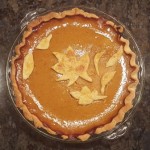
Our pumpkin pie features leaves of pie dough, brushed with egg, and sprinkled with sugar before baking
The old fashioned way to make pumpkin pie from scratch is to use fresh, organic pumpkin puree from the produce that you’ve grown in your garden. The process to make a pie takes longer because first the pumpkin must be peeled, seeded, and cut into manageable pieces and then cooked down. Then just follow your favorite pumpkin pie recipe.
_________________________________________________________________
Taking care of yourself is one of the most important things you can do over your lifetime and it starts with healthy ingredients and fresh produce.
My newest self-help wellness book is THE SELF-CARE PLANNER, A Weekly Guide to Prioritize You.
My books are available for purchase through online and traditional bookstores everywhere. Buy The Self-Care Planner and other titles offered by my publisher, Simon & Schuster online. Visit my author’s page at https://www.simonandschuster.com/authors/Meera-Lester/2137649823

It’s never too late to get healthy and live a richer, fuller, and more meaningful life. Self care is not selfish but rather an act of love.
YOU NEED THIS BOOK. WE ALL DO.
Buy it now from:
https://www.simonandschuster.com/books/The-Self-Care-Planner/Meera-Lester/9781507211649
Check out more recipes and tips for healthy country living in my Henny Penny Farmette series of cozy mysteries (Kensington Publishing, NY).
Sleuthing Egg Loss and a Nest’s Destruction
What a difference twelve hours makes. When we retired last night, the mourning doves were on their nest atop our tall ladder next to the cherry trees. It was day twelve since the birds built the nest in our garden, so we expected to see babies hatching any day now. Alas, this morning the dove family had fled and there was no sign of eggs or babies.
I believe something raided the nest. It should come as no surprise. Building it on that site seemed like a foolhardy proposition from the start. And to position it on the shelf of the ladder, exposed and near a hole big enough for a chicken egg to fall through seemed a little ridiculous.
And yet, the dove pair dutifully took turns incubating the eggs, even when the mercury hovered at the hundred degree mark on the outdoor thermometer.
In the spirit of helping the family, I kept the fountains filled with fresh water and threw handfuls of birdseed along the stone retaining wall so the pair would have a ready supply of food. Each morning, I’d hurry out to check on the doves before tackling more chores.
When I noticed the nest today and realized it was empty, the eggs were gone, and there was no sight of the doves, I began sleuthing. On the ground near the ladder lay a single long black feather and lots of leaves, knocked from the cherry trees. Not many clues but enough to make a supposition.
I recall that a flock of crows flew in to roost in nearby trees just before dusk last night. They’re both smart and predatory. They’ll raid other nests and eat eggs. I surmised that either they or a local cat or racoon drove away the dove pair and laid waste to the eggs. And yet as I write this, I can see beyond my garden window that a pair of doves are eating the seeds I cast upon the stone wall. Mourning doves can build a nest and lay a set of eggs six times during spring, so there’s still hope.
* * *
If you enjoy reading about wildlife and other topics (including delicious recipes and gardening tips) related to farmette living, check out my cozy mysteries from Kensington Publishing. The first two in the Henny Penny Farmette series are available online at Amazon, Barnes and Noble, Walmart, KOBO Books, and other sites as well as in traditional bookstores everywhere.
BEELINE TO MURDER, see http://tinyurl.com/jo4cxy
MURDER OF A QUEEN BEE, see http://tinyurl.com/zu8s7pf
A Prowling Raccoon Looking for a Warm Chicken Dinner
My farmette looks like some kind of ghostly haunt after sunset. That’s because of all the bed linen I’ve draped over citrus trees and frost-sensitive plants. On moonless nights, the backyard looks like a gathering of ghosts illuminated by the warming lamp in hanging in the hen house.
That heat lamp splays light across the back of the property. I didn’t realize right away that the claw marks in the dirt near the chicken run are from a large raccoon who, thanks to the light, now knows exactly where to find the chickens and has come prowling over the last few nights. My locks and the buried wire fencing of the chicken run are keeping the hens safe.
For the last few mornings, the water in the Italian fountain (the motor is turned off now) has been frozen and doesn’t thaw until mid-morning. Still, I see wild birds bathing in it. And we have plenty of wild birds now, thanks to twenty pounds of bird seed we’ve poured into feeders around the property.
I’m looking forward to the weather changing again in a couple of days–rain is on the way. The last storm brought a new blooms to the roses and caused the daffodils and some summer tulips to push up green shoots.
Since some of my trees perform better with a good winter chilling, I feel obliged to appreciate the cold. Besides, I can stay inside and bake, read books and seed catalogs, and write on my third cozy mystery novel.
If you enjoy reading about farmette life, you might like the farmette milieu featured in A Beeline to Murder, the first book in my Henny Penny Farmette series of cozy mysteries. See, http://tinyurl.com/p8d6owd
 Facebook
Facebook Goodreads
Goodreads LinkedIn
LinkedIn Meera Lester
Meera Lester Twitter
Twitter






